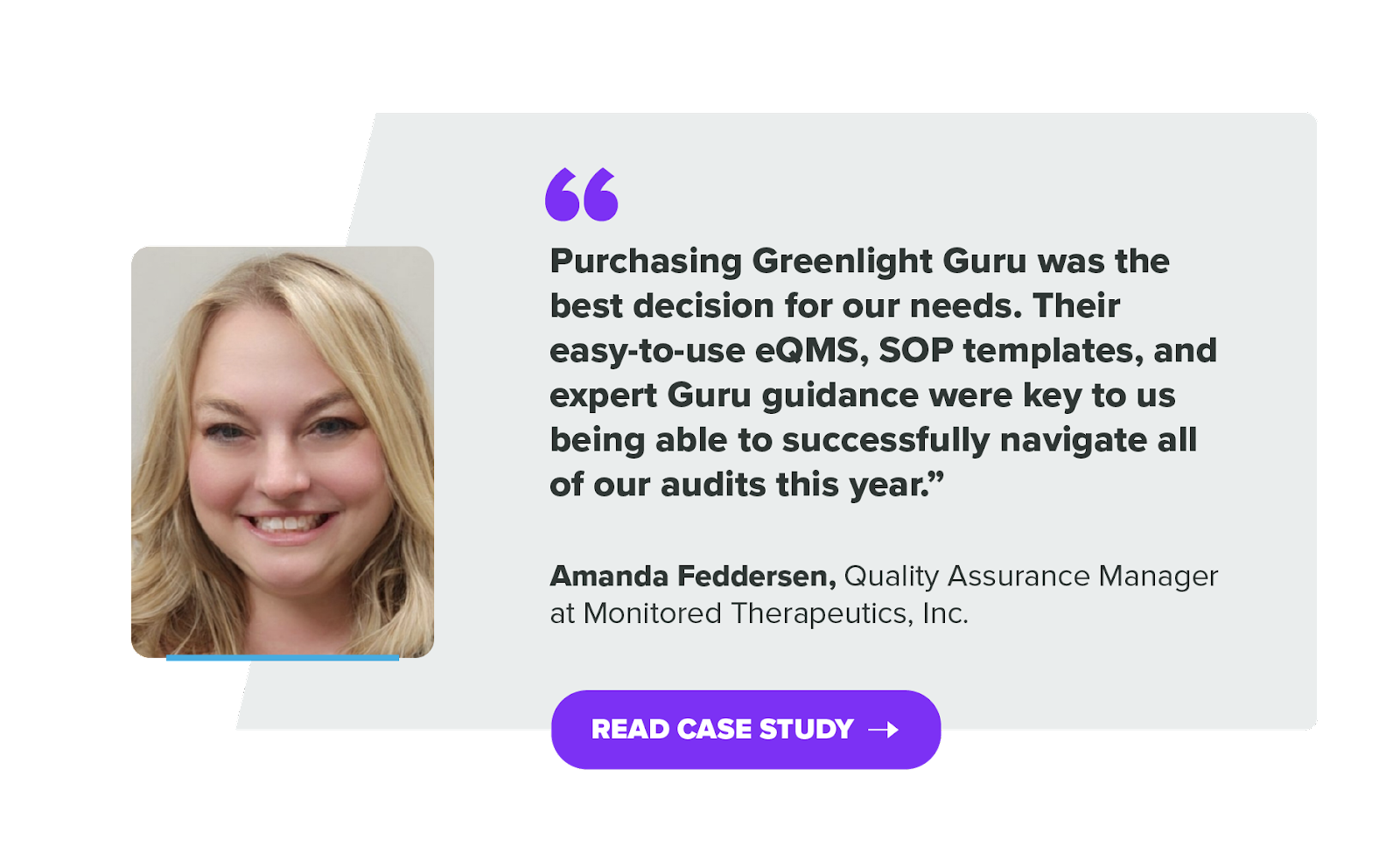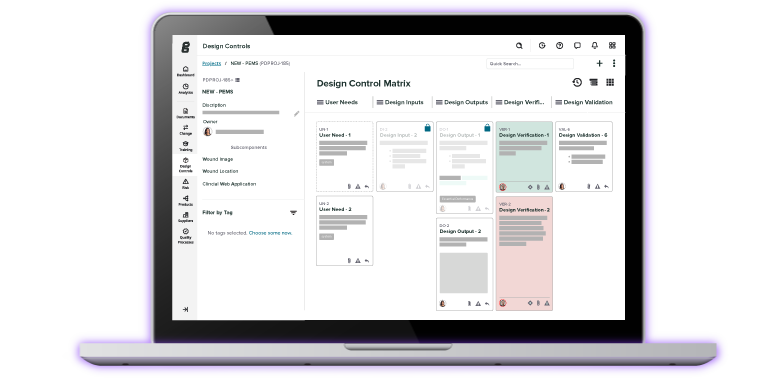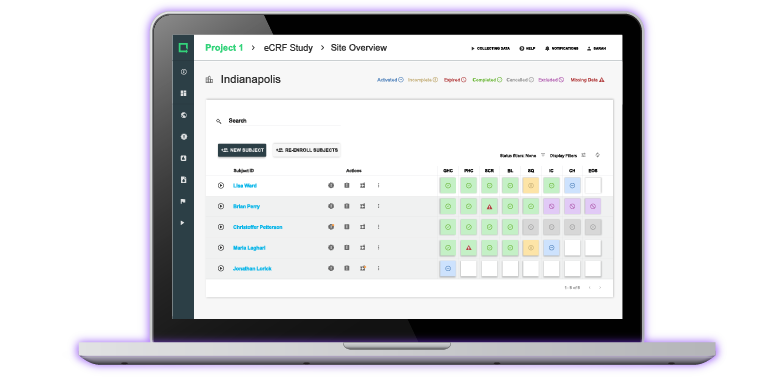Best QMS Software: Ultimate Guide to Comparing Quality Management System Solutions

One of the most critical decisions a MedTech company will make is choosing the right quality management system (QMS) solution. The QMS solution you choose will have a significant impact on how quickly you get your devices to market and your ability to pass audits to remain compliant.
The best QMS will drive you towards excellence by offering access to reliable quality data, and allow you to demonstrate closed-loop traceability at any time. But as the medical device industry and regulatory environments continue to evolve, it’s critical that your QMS is built to evolve with the MedTech industry.
Unfortunately, depending on the tools you use to manage your QMS, that may not be a given. There are quite a few QMS solutions out there, and they’re not all created equal.
With that in mind, we’ve written this guide to break down the different options your medical device company has for a QMS solution and help you make an informed decision that’s right for your business.
Table of Contents
|
Paper and ad hoc quality systems |
|
Scaling medical device companies |
Comparing the best QMS solutions for medical devices
The choice of a QMS solution will have profound effects on your business and your journey toward MedTech Lifecycle Excellence. The best QMS solutions will hasten that journey; others will put up one roadblock after another.
Generally speaking, QMS solutions fall into three categories:
-
Paper-based QMS (including digital doc-centric tools)
-
General-purpose QMS software
-
Purpose-built QMS software
Let’s take a look at each of them.
Paper-based QMS
When we refer to a “paper-based” QMS, that may mean creating and storing physical paper documents. But it can also refer to the use of digital tools like Google Docs, Excel, SharePoint, or Dropbox to manage files in a “digital filing cabinet.”
Regardless of the exact method, paper-based systems require time-consuming manual updates to the QMS and inhibit teams from having a single source of truth. Signing documents requires either physical signatures that are then scanned and uploaded for storage or require the use of third-party software for capturing compliant e-signatures.
That, in turn, makes it challenging to comply with 21 CFR Part 11, the FDA’s regulation on electronic signatures. On top of that, achieving closed-loop traceability of your quality processes—such as design controls, changes, audits, CAPAs, or customer feedback—is nearly impossible when collecting and managing a bunch of physical or disjointed records.

Clearly, ad hoc, paper-based QMS solutions are a disaster waiting to happen. So why does our Industry Benchmark report consistently find that more than a third of MedTech companies still use paper?
The answer is, paper is perceived to be cheaper. And there is some truth to that. It’s cheaper to use Google Drive or Dropbox than dedicated QMS software.
At first.
But paper becomes costly quickly. The lack of built-in compliance with regulations, the extreme difficulty maintaining traceability, and the near certainty that documents will be lost, duplicated, or go unsigned make inspections and audits a nightmare. Once your company is bogged down with findings or *gulp* under a warning letter, your paper-based QMS is going to start looking very expensive, indeed.
Paper-based QMS pros
-
Initial cost to implement is low
-
Get up and running quickly
-
Easy to use
Paper-based QMS cons
-
High costs associated with increased compliance risk
-
Massive time investment for manual updates and non-value-adding work
-
Difficult to scale with a growing business
-
Lack of traceability
-
Disjointed management of critical cross-functional MedTech processes
-
Difficult to support hybrid and remote work environments
-
Longer go-to-market timelines
-
Difficult to keep up with changing industry regulations and requirements
General-purpose QMS software
General-purpose QMS software is built to serve the basic needs of a wide variety of industries. The vendor of a general-purpose QMS solution may have clients in aerospace, cannabis, pharma, food and beverage, and other regulated industries that require some form of compliance management.
While this broad approach may work for other industries, it does pose problems for MedTech. For one thing, general-purpose tools have to work for customers in a wide range of industries. This focus on generic appeal tends to lead to less intuitive interfaces and workflows.
It also means that to work for MedTech, general-purpose software has to undergo extensive customization. Those changes, along with any others you make later on, have to be validated. As your business and your QMS becomes more complex, the added burden of customization and validation grows along with it.
There’s also a risk that your team can lose its single source of truth while using these tools. The lack of purpose-built capabilities for managing design controls, risk, and design reviews often leads to design history activities being documented offline and managed through disconnected processes within the quality system.
So, while general-purpose QMS solutions will allow you to manage traditional quality processes or document control workflows once you’ve customized them (with the help of some third-party consultants), these tools are typically a square peg in a round hole. It’ll work, but the added elbow grease on your end may not be worth it.
General-purpose QMS pros
-
Covers basic quality management system needs
-
Enables some level of traceability
-
Offers document management
-
Compatible with hybrid/remote work environments
General-purpose QMS cons
-
Lack of focus on the needs of the medical device industry
-
Requires heavy configuration and validation just to get started
-
Takes a long time to implement
-
Lack of MedTech-specific workflows can lead to activity happening outside of the system
-
Lack of in-house MedTech expertise means companies often have to hire consultants
-
Not designed with medical device regulations or international standards in mind
Purpose-built QMS software
When we say a QMS solution is “purpose-built”, that simply means that it’s been created with the needs of a single industry in mind.
At Greenlight Guru, our purpose-built QMS software was carefully crafted to support the unique needs of medical device companies. That includes MedTech-specific modules within the quality system that cover all the stages of a medical device’s product lifecycle.
It also means that our QMS software is designed to ensure compliance with the latest regulations and standards, like FDA’s 21 CFR Part 820 and ISO 13485:2016, and is updated as those regulations and standards evolve. This helps companies better manage and reduce risk, accelerate time to market, and pass audits/inspections with flying colors.
Because it’s built to help you stay in compliance and maintain closed-loop traceability between design controls, risk management, design reviews, and postmarket surveillance activities throughout the total product lifecycle, a purpose-built QMS solution like Greenlight Guru’s will lack some of the extensive customization options of a general-purpose QMS. Why? Because we’ve created a scalable, repeatable, and audit-ready process for you so you can focus on your business.
Greenlight Guru’s QMS software lets you focus on what truly matters: making high-quality medical devices that improve the quality of life for patients around the world.
Purpose-built QMS pros
-
Built specifically for MedTech companies and evolves with the industry
-
Access to in-house MedTech experts and courses that support you on your journey
-
Closed-loop traceability throughout your entire QMS keeps you audit-ready
-
FDA and ISO best practices are baked into every feature
-
Reduced validation burden
-
Single source of truth supports hybrid/remote work environments
-
Easy user experience
-
Built to help you scale and manage post-market surveillance
-
Streamlined implementation process so you can get to market faster
Purpose-built QMS cons
-
Not well suited for industries outside of MedTech
-
Doesn’t support extensive customizations
As you may have guessed, we feel pretty strongly that our QMS software is the best QMS for MedTech companies. Though the upfront cost of paper and other legacy solutions may seem attractive at first, their limitations consistently force companies to spend time and money creating workarounds and dealing with inspection and audit findings.
You should also consider what your QMS solution provider brings to the table outside of its software. How else do they support your mission and your work?
At Greenlight Guru, our focus on the MedTech space allows us to go beyond offering software. Customers consistently point to our Customer Success team (a.k.a. the Gurus) as an indispensable part of their experience with Greenlight Guru. Our educational ecosystem also includes Greenlight Guru Academy—a one-stop shop for MedTech courses and certifications—and our MedTech Excellence Community, where medical device professionals come together to learn from one another.
Here’s how it comes together.

You need a QMS. There’s no way around that. The question is, should you invest in a quick fix or a MedTech-specific tool and support system that will grow with your company as you keep tackling some of the world’s toughest problems?
Get your free demo of Greenlight Guru’s purpose-built QMS software today!
Best QMS software for different MedTech companies
Greenlight Guru has worked hard to create a connected quality ecosystem that integrates quality processes, design controls, and risk activities throughout the device lifecycle. Here’s what users had to say about using the product.
Our QMS solution has been adopted by a wide variety of MedTech companies around the world. From small teams to established companies with multiple device lines, Greenlight Guru serves them all.
Here are just a few of the 1,000+ MedTech companies that trust Greenlight Guru for their QMS solution.

Best QMS solution for scaling medical device companies
Puzzle Medical Devices, Inc. is striving to improve the quality of life with their device, ModulHeart, which provides a minimally invasive option for heart failure treatment. Since Puzzle’s device is Class III, it was critical they had a QMS that would keep them compliant while allowing them to move quickly and manufacture prototypes.
With Greenlight Guru, the team at Puzzle accelerated their go-to-market timeline by 5 months in the first year of using the QMS. They were also able to manufacture precise and high-quality prototypes in a fast-paced environment while maintaining compliance with regulations.
Best QMS software for established companies selling devices internationally
The team at C2DX acquired a high-quality device—the STIC Intra-Compartmental Pressure Monitor System—from Stryker, but they needed to ensure that they could continue delivering the same quality from day one.
C2DX was started by MedTech industry veterans, and their extensive industry experience meant they knew the limitations of other QMS solutions, so when they started C2DX, they decided to implement a purpose-built QMS from the get-go.
That decision not only allowed them to pass audits with flying colors, it meant they had the post-market surveillance tools in place to monitor their product, react quickly to any issues, and continue growing.
Best QMS software for MedTech companies to stay audit ready
Monitored Therapeutics, Inc. (MTI) is a remote patient monitoring company with a focus on respiratory diseases. MTI sells their proprietary diagnostics products globally and needed an affordable QMS that would help them successfully navigate audits and manage post-market surveillance.
MTI chose Greenlight Guru. The intuitive and powerful QMS software—along with guidance from Greenlight’s industry experts, the Gurus—helped MTI pass six audits in one year, including ISO and MDSAP audits. As they continue to grow their product line, MTI knows that Greenlight Guru will be with them every step of the way.
 Learn more about how we help our customers today →
Learn more about how we help our customers today →
The best QMS makes quality your competitive differentiator
The choice of a QMS solution impacts more than just how long it takes you to find a document. As your company grows, so will your quality management system. Files grow, documentation becomes more complex, and any inefficiencies will quickly be magnified.
A general-purpose tool that served your basic needs when your company was taking shape may end up becoming a drag on productivity or—in the worst case—an insurmountable barrier to the continued growth of your business.
We surveyed more than 500 medical device professionals for our 2025 Medical Device Industry Benchmark Report. Our survey found that 43% of companies are using paper or general-purpose tools for quality management. And that number jumps to 59% for product development.
However, companies using tools designed for the medical device industry were 2x more likely to say they were equipped to meet their quality goals.
When we asked why respondents continued to use general-purpose tools or paper, 69% cited the cost of switching and 46% told us they feared how long it would take to implement a new system. These are legitimate worries. It’s always hard to get the budget for a new software solution, and with general-purpose systems, implementation can be time-consuming.
But there are also the hidden costs of the status quo to consider. The Benchmark Report also found that:
- The typical delay in commercialization due to gaps in traceability was 6+ months
- 62% of teams are spending more time prepping for audits than improving quality
- Companies using disconnected tools were 3.5x more likely to get hit with major audit findings.
- 48% of teams lack confidence in their ability to manage global compliance at scale
The truth is that over time, the cost of doing nothing, or delaying technology investments, can end up being far greater than the cost of a new QMS.
So, if you’re ready to see how a purpose-built QMS software can help you pass audits, grow your business, and get your devices into the hands of the patients who need them most, then get your free demo of Greenlight Guru today!
Etienne Nichols is the Head of Industry Insights & Education at Greenlight Guru. As a Mechanical Engineer and Medical Device Guru, he specializes in simplifying complex ideas, teaching system integration, and connecting industry leaders. While hosting the Global Medical Device Podcast, Etienne has led over 200...
Related Posts
5 Dos and Don'ts when Choosing a QMS Solution for Your Medical Device Company
How PLM and QMS Solutions Work Together in MedTech
QMSR & the End of DMR, DHR, DHF: How FDA’s New Rule Impacts Record-Keeping
Get your free PDF
The Ultimate Guide to Comparing QMS Solutions
%20Best%20QMS%20Software-%20Ultimate%20Guide%20to%20Comparing%20Quality%20Management%20System%20Solutions.png?width=250&height=324&name=(cover)%20Best%20QMS%20Software-%20Ultimate%20Guide%20to%20Comparing%20Quality%20Management%20System%20Solutions.png)



.png?width=1199&name=ROI_Slide-In-02%20(1).png)







